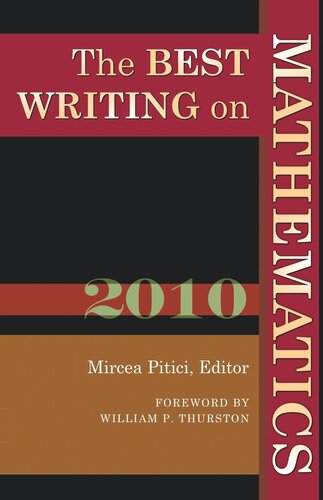

Most ebook files are in PDF format, so you can easily read them using various software such as Foxit Reader or directly on the Google Chrome browser.
Some ebook files are released by publishers in other formats such as .awz, .mobi, .epub, .fb2, etc. You may need to install specific software to read these formats on mobile/PC, such as Calibre.
Please read the tutorial at this link: https://ebookbell.com/faq
We offer FREE conversion to the popular formats you request; however, this may take some time. Therefore, right after payment, please email us, and we will try to provide the service as quickly as possible.
For some exceptional file formats or broken links (if any), please refrain from opening any disputes. Instead, email us first, and we will try to assist within a maximum of 6 hours.
EbookBell Team

4.0
46 reviewsThis anthology brings together the year's finest writing on mathematics from around the world. Featuring promising new voices alongside some of the foremost names in mathematics, The Best Writing on Mathematics makes available to a wide audience many articles not easily found anywhere else--and you don't need to be a mathematician to enjoy them. These writings offer surprising insights into the nature, meaning, and practice of mathematics today. They delve into the history, philosophy, teaching, and everyday occurrences of math, and take readers behind the scenes of today's hottest mathematical debates. Here readers will discover why Freeman Dyson thinks some mathematicians are birds while others are frogs; why Keith Devlin believes there's more to mathematics than proof; what Nick Paumgarten has to say about the timing patterns of New York City's traffic lights (and why jaywalking is the most mathematically efficient way to cross Sixty-sixth Street); what Samuel Arbesman can tell us about the epidemiology of the undead in zombie flicks; and much, much more.
In addition to presenting the year's most memorable writing on mathematics, this must-have anthology also includes a foreword by esteemed mathematician William Thurston and an informative introduction by Mircea Pitici. This book belongs on the shelf of anyone interested in where math has taken us--and where it's headed.